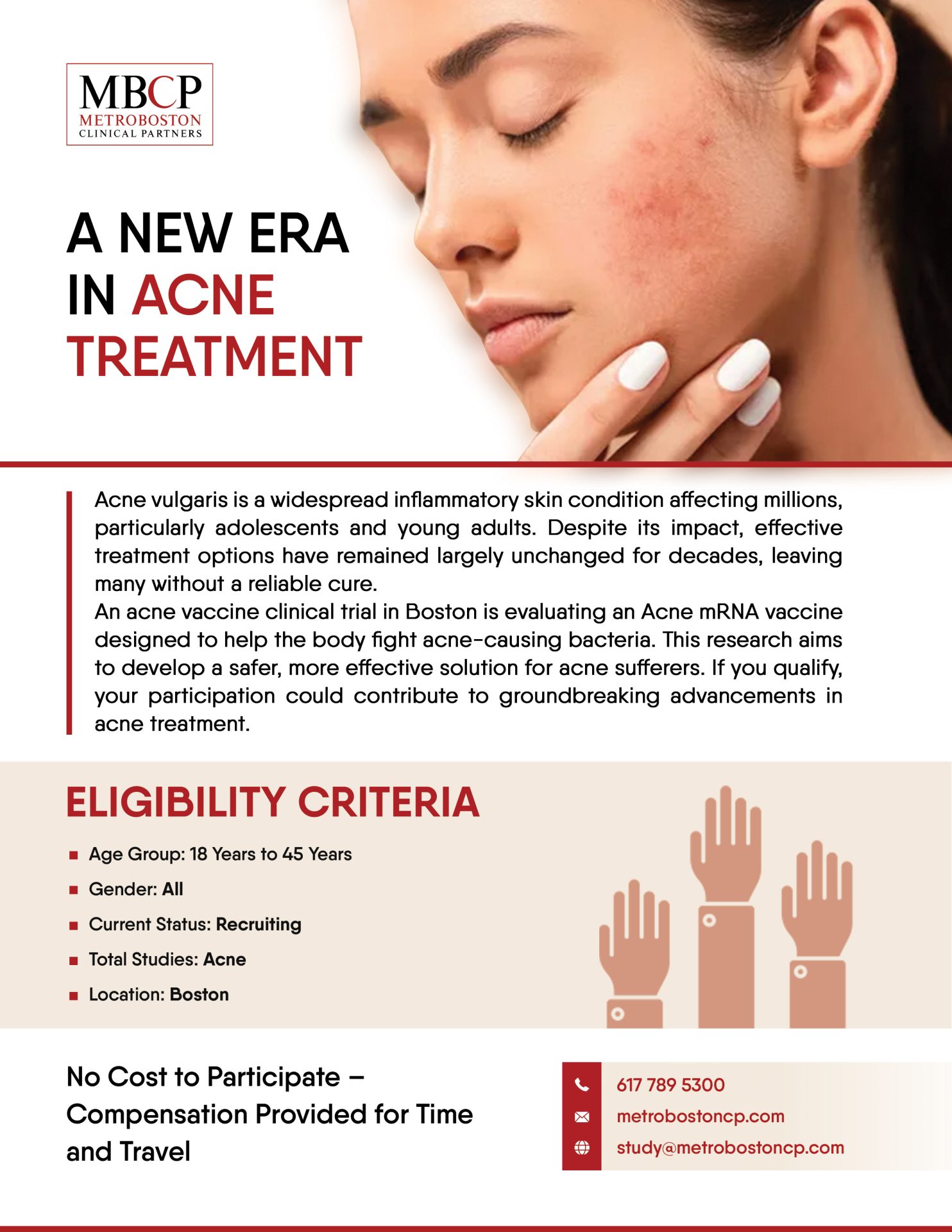A clinical trial in Boston is being conducted to evaluate the safety and effectiveness of a potential Acne mRNA vaccine.
Let’s Recover Through
Acne mRNA Vaccine: Hope for a Lasting Solution
Acne vulgaris (acne) is a common inflammatory skin condition, affecting around 231 million people worldwide, especially adolescents and young adults. It is one of the leading causes of nonfatal disease burden, yet treatment options have remained largely unchanged for the past 30 years. Currently, no safe and effective cure exists.
A potential new approach is the Acne mRNA vaccine, designed to help the body target and control acne-causing bacteria. To assess its potential, an acne vaccine clinical trial will be conducted to evaluate the vaccine’s safety, effectiveness, and ability to trigger an immune response.
Enroll Now

Tolerability, Efficacy, And Safety Evaluation
Eligibility Criteria
Join the Acne mRNA vaccine clinical trial in Boston and help advance research toward a safer, more effective acne treatment.
Age Group
18 Years to 45 Years
Gender
All
Current Status
Recruiting
Total Studies
01
Location
Boston
Frequently Asked Questions
What causes acne, and why do some people experience it more severely than others?
Acne occurs when hair follicles become clogged with oil and dead skin cells, leading to inflammation. Hormonal changes, genetics, bacteria, and lifestyle factors can influence its severity. Some individuals are more prone to acne due to their genetic makeup, hormonal imbalances, or skin type.
How do current acne treatments work, and why is there still no permanent cure?
Acne treatments, such as topical creams, antibiotics, and oral medications, aim to reduce inflammation, control oil production, and kill acne-causing bacteria. However, they do not address all underlying causes, and acne can return after treatment stops. A permanent cure remains elusive because acne is influenced by multiple factors, including genetics and hormones.
Can lifestyle and diet changes help manage acne symptoms effectively?
While lifestyle and diet alone may not cure acne, they can help manage symptoms. Reducing high-glycemic foods, dairy intake, and stress levels may improve skin health. Maintaining a proper skincare routine, staying hydrated, and avoiding harsh products can also prevent breakouts. However, medical treatments are often necessary for severe cases.
What are the potential benefits and risks of participating in an acne vaccine clinical trial?
Participants in an acne vaccine clinical trial may gain access to innovative treatments before they become widely available. They also contribute to research that could lead to better acne solutions. However, there may be risks, such as potential side effects, unknown effectiveness, or time commitments required for follow-ups.
How does the Acne mRNA vaccine trial work, and who is eligible to participate?
The acne vaccine clinical trial aims to test a new approach that helps the immune system target acne-causing bacteria. Eligible participants typically include individuals with moderate to severe facial acne vulgaris who meet specific health criteria. The trial will assess the vaccine’s safety, effectiveness, and ability to trigger an immune response.